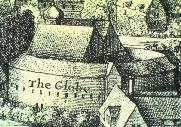| directory |
| home | contact |
|
|||||||||||||||
| search | |||||||||||||||
CymbelinePlease see the bottom of the page for explanatory notes.
Cymbeline, Act 1, Scene 3 _______ Explanatory Notes for Act 1, Scene 2 From Cymbeline. A.W. Verity. Cambridge, University Press. ______ The scene with its ironical "asides" of the Second Lord and somewhat thin banter resembles The Tempest, II. i. So again II. i. 8. passable, affording free passage through; with a quibble, perhaps, on pass in its fencing sense = 'a thrust at an adversary.' 11, 12. The metaphor of a debtor who slinks through back-streets to escape notice. 27, 28. go not together, are not equal -- on a par, as we say. she's a good sign... wit. She has a "fair outward show," but lacks wit. "It should be remembered, that anciently almost every sign [of an inn] had a motto, or some attempt at a witticism, underneath it" -- Steevens. For the drift of the remark cf. I. 6. 15-18. How to cite the explanatory notes:_____ |
More to Explore
_____
|
©1999-2021 Shakespeare Online. All Rights Reserved.
 Shakespeare probably began his education at the age of six or seven at the Stratford grammar school, which is still standing only a short distance from his house on Henley Street. Although we have no record of Shakespeare attending the school, due to the official position held by John Shakespeare it seems likely that he would have decided to educate young William at the school which was under the care of Stratford's governing body.
Shakespeare probably began his education at the age of six or seven at the Stratford grammar school, which is still standing only a short distance from his house on Henley Street. Although we have no record of Shakespeare attending the school, due to the official position held by John Shakespeare it seems likely that he would have decided to educate young William at the school which was under the care of Stratford's governing body.